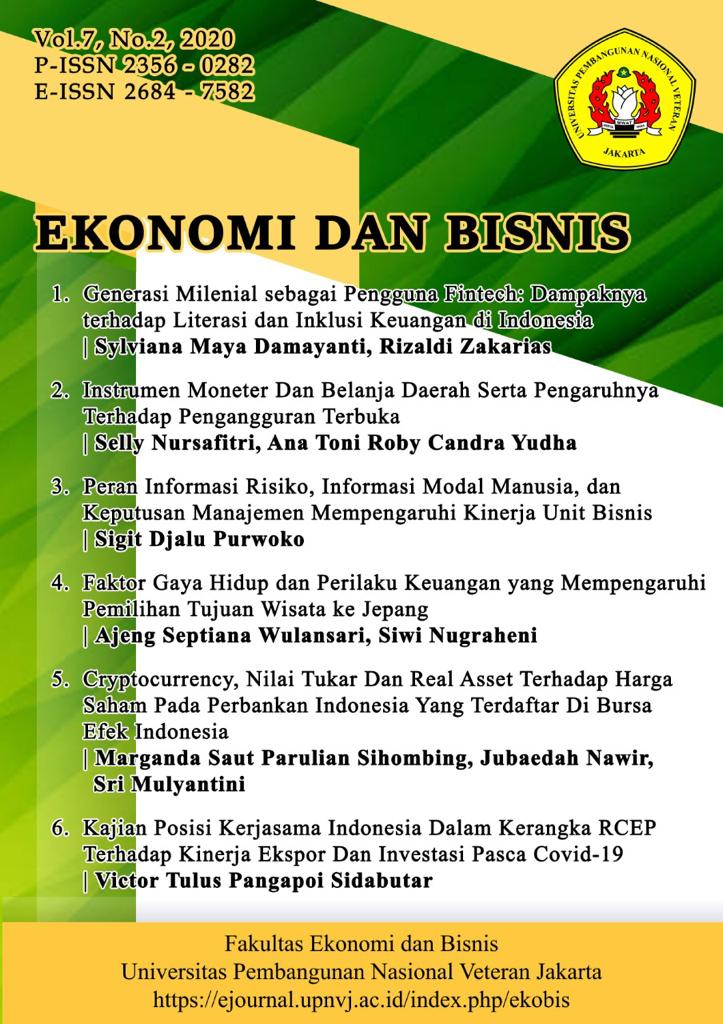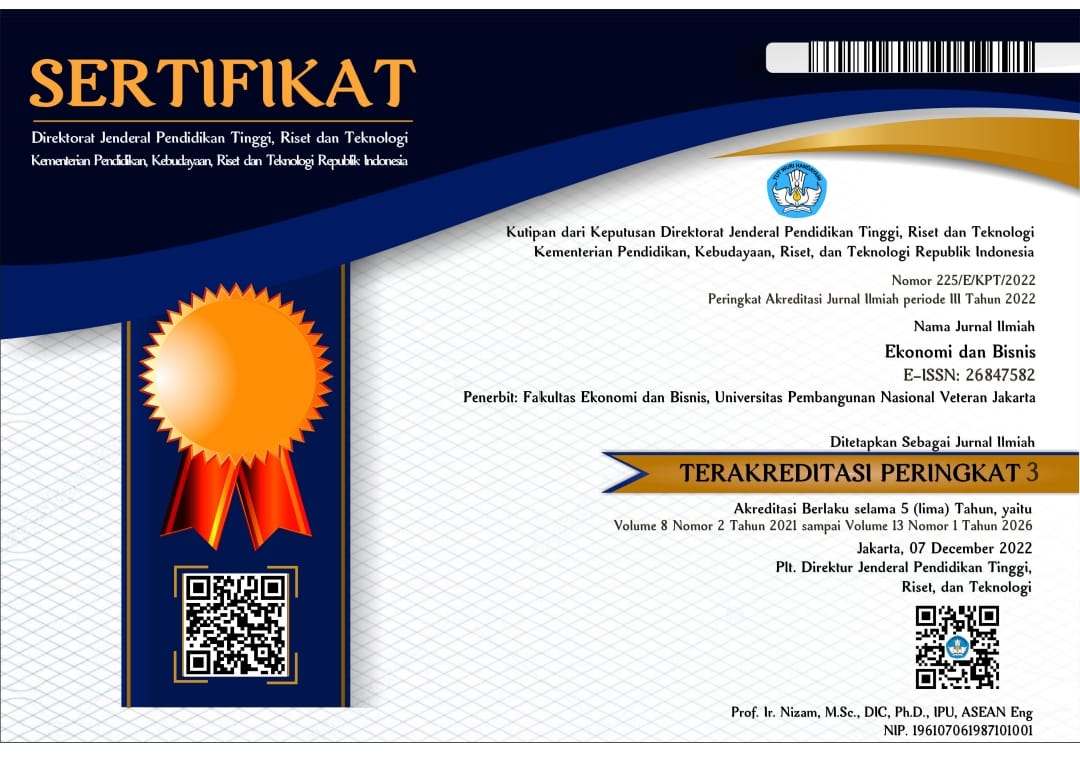KAJIAN POSISI KERJASAMA INDONESIA DALAM KERANGKA RCEP TERHADAP KINERJA EKSPOR DAN INVESTASI PASCA COVID-19
DOI:
https://doi.org/10.35590/jeb.v7i2.2126Keywords:
RCEP, COVID-19, Rantai Pasokan, EksporAbstract
Regional Comprehensive Economic Partnership (RCEP) merupakan kerjasama regional yang memiliki ukuran pasar 48% dari populasi dunia dan menyumbang 32% dari ekspor barang dunia dan 28% dari Produk Domestik Bruto dimana Indonesia merupakan salah satu anggota di dalamnya. Pandemi COVID-19 membuat kerjasama tersebut terancam akibat terganggunya rantai pasokan global dan mulai munculnya pemikiran untuk memindahkan rantai pasokannya ke negara yang lebih dekat atau melakukan renasionalisasi. Hal ini mengancam posisi Indonesia yang yang ingin meningkatkan ekspornya secara regional meskipun kerjasama regional tersebut tidak dapat dimanfaatkan Indonesia secara maksimal untuk meningkatkan kinerja ekspornya secara keseluruhan ke negara anggota lainnya. Indonesia sendiri harus berjuang dalam menahan laju penularan COVID-19 di dalam negerinya guna menjaga posisinya dalam rantai pasokan regional dan global dan menjaga kepercayaan investor kepada Indonesia.
References
[BPS] Badan Pusat Statistik. 2020. “Berita Resmi Statistik 5 Agustus 2020.” Bps.Go.Id No 64/08/T(27): 1–52. https://papua.bps.go.id/pressrelease/2018/05/07/336/indeks-pembangunan-manusia-provinsi-papua-tahun-2017.html.
ASEAN Policy Brief. 2020. “Economic Impact of Covid-19 Outbreak on ASEAN.” Association of Southeast Asian Nations (ASEAN) (April): 1–17. https://asean.org/storage/2020/04/ASEAN-Policy-Brief-April-2020_FINAL.pdf.
Barua, Suborna. 2020. “COVID-19 Pandemic and World Trade: Some Analytical Notes.” SSRN Electronic Journal (April): 1–35.
Bonadio, Barthélémy, Zhen Huo, Andrei A. Levchenko, and Nitya Pandalai-Nayar. 2020. “Global Supply Chains in the Pandemic.” NBER Workign Paper Series (27224): 48.
Bruijl, Gerard H. Th. 2018. “The Relevance of Porter’s Five Forces in Today’s Innovative and Changing Business Environment.” SSRN Electronic Journal (January).
Chaisse, Julien, and Richard Pomfret. 2019. “The RCEP and the Changing Landscape of World Trade : Assessing Asia-Pacific Investment Regionalism next Stage.” Law and Development Review 12(1): 159–90.
Chandran, Sarath. 2018. “India in the Regional Comprehensive Economic Partnership (RCEP) Need for Caution.” SSRN Electronic Journal.
Ciglovska, Biljana. 2020. “THE GLOBAL INTERNATIONAL TRADE UNDER THE PRESSURE OF COVID 19 PANDEMIC – CONSQUENCES.” In Scientific Challenges for Sustainable Development - SCfSD20, , 25–36.
CNN Indonesia. 2020. “Bappenas Proyeksi Jumlah Pengangguran 12,7 Juta Tahun Depan.” CNN Indonesia. https://www.cnnindonesia.com/ekonomi/20200622165157-92-516112/bappenas-proyeksi-jumlah-pengangguran-127-juta-tahun-depan.
Department of State - United States of America. 2019. “A Free and Open Indo-Pacific: Advancing a Shared Vision.” https://www.state.gov/wp-content/uploads/2019/11/Free-and-Open-Indo-Pacific-4Nov2019.pdf.
Enderwick, Peter, Buckley Enderwick, and Peter Jennings. 2020. “Rising Regionalization : Will the Post-COVID-19 World See a Retreat from Globalization ?” Transnational Corporations Journal 27(2): 99–112.
Gao, Hongzhi, and Monica Ren. 2020. “Overreliance on China and Dynamic Balancing in the Shift of Global Value Chains in Response to Global Pandemic COVID-19: An Australian and New Zealand Perspective.” Asian Business and Management 19(3): 306–10. https://doi.org/10.1057/s41291-020-00121-3.
Gaur, Pankhuri. 2020. “India’s Withdrawal from RCEP: Neutralising National Trade Concerns.” Journal of the Asia Pacific Economy 0(0): 1–19. https://doi.org/10.1080/13547860.2020.1809772.
George, Ammu, Changtai Li, Jing Zhi Lim, and Taojun Xie. 2020. “Propagation of Epidemics’ Economic Impacts via Production Networks: The Cases of China and ASEAN during SARS and COVID-19.” SSRN Electronic Journal: 1–31.
Guerrieri, Veronica, Guido Lorenzoni, Ludwig Straub, and Ivan Werning. 2020. Macroeconomic Implications of Covid-19: Can Negative Supply Shocks Cause Demand Shortages? http://www.nber.org/papers/w26918.
Hsieh, Pasha L. 2019. “Building the RCEP: Legal and Political Implications.” Proceedings of the ASIL Annual Meeting 113: 367–70.
Hsieh, Pasha L et al. 2017. “IILJ Working Paper 2017 / 4 MegaReg Series The RCEP , New Asian Regionalism and the Global South.”
Ivanov, Dmitry. 2020. “Viable Supply Chain Model: Integrating Agility, Resilience and Sustainability Perspectives—Lessons from and Thinking beyond the COVID-19 Pandemic.” Annals of Operations Research. https://doi.org/10.1007/s10479-020-03640-6.
Javorcik, Beata (EBRD). 2020. “Global Supply Chains Will Not Be the Same in the Post-COVID-19 World.” In COVID-19 and Trade Policy: Why Turning Inward Won’t Work, eds. Richard E Baldwin and Simon J Evenett. London, UK: CEPR Press, 111–16. www.cepr.org.
Ke, Heren. 2019. “ASEAN in the Middle of US and Chinese Rivalry : ASEAN Cooperation with RCEP in Reducing the Impact of the Trade War.” International Journal of Science and Society 1(1): 1–12. http://ijsoc.goacademica.com/index.php/ijsoc/article/view/1.
Kimura, Fukunari, Shandre Mugan Thangavelu, Dionisius Narjoko, and Christopher Findlay. 2020. “Pandemic (COVID-19) Policy, Regional Cooperation and the Emerging Global Production Network†.” Asian Economic Journal 34(1): 3–27.
Kowalski, Przemyslaw. 2020. “Will the Post-COVID World Be Less Open to Foreign Direct Investment?” In COVID-19 and Trade Policy: Why Turning Inward Won’t Work, eds. Richard E Baldwin and Simon J Evenett. London, UK: CEPR Press, 131–49. https://voxeu.org/system/files/epublication/Covid-19_and_Trade_Policy.pdf.
Li, Qiaomin, and Hee Cheol Moon. 2018. “The Trade and Income Effects of RCEP: Implications for China and Korea.” Journal of Korea Trade 22(3): 306–18.
Mahadevan, Renuka, and Anda Nugroho. 2019. “Can the Regional Comprehensive Economic Partnership Minimise the Harm from the United States–China Trade War?” World Economy 42(11): 3148–67.
Miroudot, Sébastien. 2020. “Resilience versus Robustness in Global Value Chains: Some Policy Implications.” In COVID-19 and Trade Policy: Why Turning Inward Won’t Work, eds. Richard E Baldwin and Simon J Evenett. London, UK: CEPR Press, 200. https://voxeu.org/content/covid-19-and-trade-policy-why-turning-inward-won-t-work.
Mueller, Lukas Maximilian. 2019. “ASEAN Centrality under Threat–the Cases of RCEP and Connectivity.” Journal of Contemporary East Asia Studies 8(2): 177–98. https://doi.org/10.1080/24761028.2019.1691703.
OECD. 2020. “Impact of the Corona Virus (COVID-19) Crisis on Development Finance.” Tackling Coronavirus (Covid-19): Contributing to a Global Effort. https://read.oecd-ilibrary.org/view/?ref=134_134569-xn1go1i113&title=The-impact-of-the-coronavirus-(COVID-19)-crisis-on-development-finance.
Petri, Peter A, and Michael G Plummer. 2020. East Asia Decouples from the United States: Trade War, COVID-19, and East Asia’s New Trade Blocs.
Santos-Paulino, Amelia U. 2019. “The Asian Economic Integration Cooperation Agreement: Lessons from Economic and Social Development.” 2019 United Nations Environment Assembly Study Guide.
Sharfuddin, Syed. 2020. “The World after Covid-19.” Round Table 109(3): 247–57. https://doi.org/10.1080/00358533.2020.1760498.
Wang, Heng. 2019. “Building toward the RCEP? Reflections on the ASEAN-China FTA.” ASEAN Law in the New Regional Economic Order: 46–63.
Yean, Tham Siew. 2020. “The Hosting of International Production in ASEAN , Post- Pandemic.” ISEAS Perspective (71): 1–13. https://think-asia.org/bitstream/handle/11540/12163/ISEAS_Perspective_2020_71.pdf?sequence=1.
Downloads
Published
How to Cite
Issue
Section
License
Authors who publish with this journal agree to the following terms:
Authors retain copyright and grant the journal right of first publication with the work simultaneously licensed under a Creative Commons Attribution 4.0 International License that allows others to share the work with an acknowledgment of the work's authorship and initial publication in this journal.
Authors can enter into separate, additional contractual arrangements for the non-exclusive distribution of the journal's published version of the work (e.g., post it to an institutional repository or publish it in a book), with an acknowledgment of its initial publication in this journal.
Authors are permitted and encouraged to post their work online (e.g., in institutional repositories or on their website) before and during the submission process, as it can lead to productive exchanges, as well as earlier and greater citation of published work.
This work is licensed under a Creative Commons Attribution 4.0 International License.












